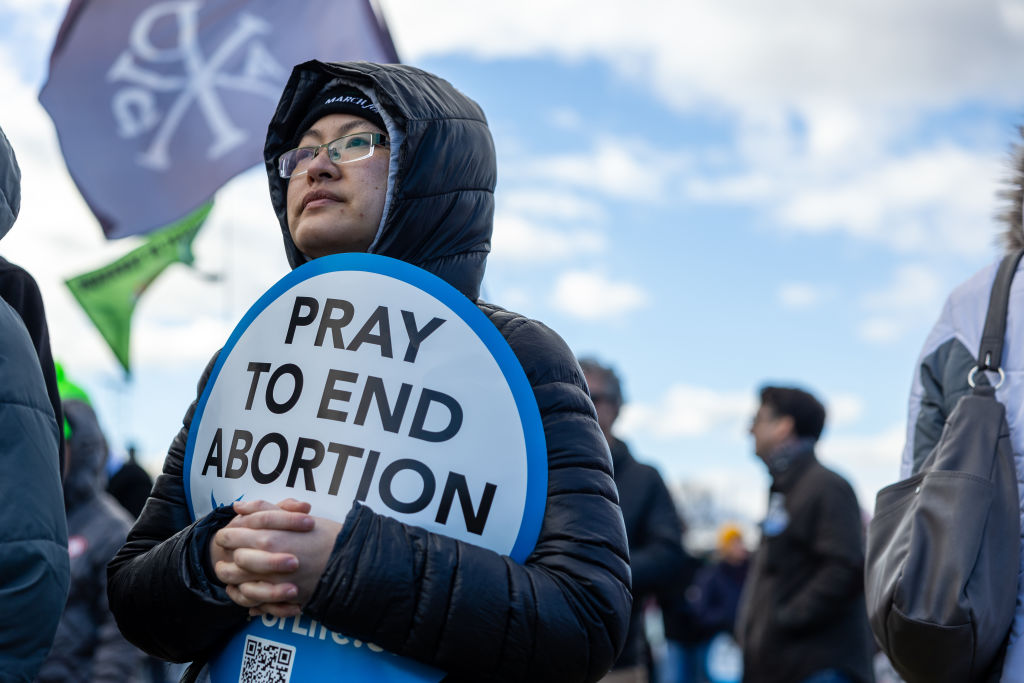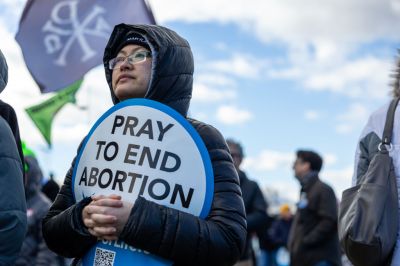Happy Wednesday! We hope you’ll understand why this edition of Dispatch Faith is hitting your inbox several days later than usual. As details were becoming clearer Saturday night about the assassination attempt on former President Donald Trump, which injured him and two others and left another man dead, we decided to focus all our editorial efforts on covering an unfolding national crisis. Publishing anything else not directly related to that didn’t seem right.
The questions and challenges stemming from that tragedy continue, but the immediate crisis seems to have abated. That being the case, we wanted to share with you what we had planned to publish Sunday—especially given that the Republican Party approved its new platform Monday night.
The Supreme Court’s reversal of Roe v. Wade more than two years ago was supposed to mark a new age of increasingly life-affirming legislation and a receding abortion regime. But since then the pro-life movement has faced defeat at the ballot box in multiple states and a newly galvanized opposition. And now, taking its cues from Trump, the Republican Party seems to be marginalizing its most committed pro-life members by finalizing big changes regarding abortion to the party platform.
Writer, scholar, and Baylor University professor Matthew Lee Anderson argues that in the face of these new political realities, pro-lifers—particularly religious pro-lifers—should refocus on two key virtues: forbearance and patience. Failing to do so may keep them from achieving what they want most.
Note: You’re receiving Dispatch Faith because you were formerly a reader of David French’s French Press. We hope you’re enjoying the new offering and will consider forwarding it to others. And as always, let us know how we can make the newsletter better; we plan to experiment with different formats in the coming weeks and months.
Matthew Lee Anderson: Forbearance and Patience Will Be Key For Pro-Lifers

While the pro-life movement has floundered politically since Roe v. Wade was overturned, last week marked a new phase of its ongoing crisis.
First, two senators who at that time were being vetted to be Donald Trump’s running mate—J.D. Vance and Marco Rubio—both sought to distance themselves from the pro-life movement’s aspirations of a federal abortion ban. While Rubio cited the political reality that such bans are unpopular, Vance—whom Trump selected as his vice presidential candidate on Monday—went further and endorsed mifepristone access outright. The Republican National Committee followed by revamping the party platform, removing the call for a constitutional amendment to protect human life that Republicans had endorsed since 1980 while adding support for contraception access and in vitro fertilization.
Some pro-life activists sought to make the best of it: Marjorie Dannenfelser of the Susan B. Anthony Pro-Life America suggested that the platform remains “strongly pro-life” because it affirms that the 14th Amendment entails that “no person can be denied life or liberty without due process,” a position echoed by Americans United for Life, Students for Life, and others. Yet when Trump announced his position of returning abortion to the states in April, Dannenfelser said she was “deeply disappointed” and last week described weakening the platform as a “mistake.”
However pro-life activists want to spin things, the Republican Party’s amendment of the platform represents a deliberate marginalization of the pro-life movement. It took 50 years for the movement to pull the right levers to overturn Roe v. Wade—which will likely prove the easy part of the journey toward significantly reducing abortions in our country. By comparison, it took nearly a century for the temperance movement to pass a constitutional amendment to prohibit the sale and transport of alcohol.
What happens over the next few years will profoundly test the movement’s forbearance and demand that it carefully reconsider its political strategies. The movement’s sense of urgency elected Trump and subsequently overturned Roe—but the shift in the prevailing political winds demands a different political disposition.
For religious pro-lifers, at least, endurance in the face of injustice stems from the hope we place in God. “How long, oh Lord?” the Psalmist cries in the face of injustice and wrong. In most contexts, the answer is: longer than we might like. Martin Luther King Jr. made famous the idea that the arc of the moral universe bends toward justice. But he also said the arc was long: God often seems to be in no hurry to bring about the social transformation we desire, in part because the sources of wrongdoing often run deeper than we realize or imagine. So pro-lifers must persist in hope for a society we will likely not see in our own time—remembering above all that our hope for the little lights of justice here and now are only a sign of our great hope in the dawning light of God, the only hope that Saint Paul tells us will not disappoint.
But the pro-life movement does face a crisis: The political approach that got us to Dobbs may not be able to take us beyond it. But forbearance is not inaction and patience is not quiescence. Instead, forbearance and patience demand we look anew at the world for opportunities that had been previously hidden from view. The GOP might not be quite a pro-choice party, as The Gospel Coalition’s Joe Carter suggests. But though the transformation of its platform signals the end of Reagan-era pro-life politics, it also represents the opportunity to rethink pro-life politics from the ground up (just as Trump’s election prompted many conservatives to re-evaluate their economic policies). The political pressures the movement faces are novel, but they also offer a unique opportunity to creatively and faithfully work to persuade all Americans to protect embryonic human life.
To do so, pro-lifers need to come to terms with the fact that Marco Rubio is right: Dobbs definitively reshaped the landscape of reproductive politics in ways that are hostile to pro-life views. The challenges are twofold. On one side, Roe’s dissolution meant that policy positions that could have been dismissed as the delusional pipe dreams of a small handful of activists suddenly became real. The “human life amendment” was always aspirational—but so long as Roe was the law of the land, it was strictly symbolic. No longer. Dobbs meant that formerly symbolic positions suddenly became substantive, inherently raising the stakes for endorsing restrictions on abortion.
On the other side, Dobbs liberated Trump from any debt to the pro-life movement, allowing him to return social conservatives to their historical position of being the GOP’s ugly stepchildren. His alliance with pro-lifers was one of mutual necessity: In 2016, both were fringe outsiders to the Republican Party’s mainstream. Social conservatives had enough votes and enthusiasm in each cycle to make their candidates a contender (like Mike Huckabee in 2008), but never enough to get a win. Republicans could reliably count on such votes, but rarely (if ever) catered to them once in office. Trump’s outsider status mirrored pro-lifers’ own: He needed pro-lifers as much as they needed him.
All that has changed. Trump has remade the party in his own image and no longer needs the pro-life vote. Where else can pro-lifers go—and why would they betray the president who gave us our most significant political victory ever? The pro-life movement needs Donald Trump at this point more than he needs the movement. And that likely means this will be the most socially liberal iteration of the GOP ever. Despite the moral panic about “Christian nationalism,” Trump has gone out of his way to court voters whom the Religious Right has historically opposed. The pro-life movement’s furor about the platform changes obscured the fact that the RNC also dropped the opposition to gay marriage and said nothing about supporting families. Such changes are reflected at party conventions. Peter Thiel was the first openly gay speaker at the Republican National Convention in 2016. The first openly bisexual presenter who organized a “Slutwalk,” Amber Rose, presented this year. We have come a long way to somewhere from Pat Buchanan decrying the “raw sewage of pornography that so terribly pollutes our popular culture” from the convention stage.
The pro-life movement’s effort to legislatively restrict abortion access will invariably run aground on the moral impulses and attitudes that fuel social liberalization. After Dobbs, the pro-life movement barreled ahead with talk of a national ban. Fueled by polling that indicates Americans’ widespread opposition to abortion after 15 weeks, the movement seemed emboldened to think that the urgency that elected Trump would translate into more electoral victories. However, Americans’ discomfort with abortion invariably collides with our fundamental American impulse: the desire to be left alone and do likewise to our neighbors. When abortion was permitted, Americans were opposed to it—now that it can be restricted, we will fight to preserve it. It is one thing to tell a pollster you are opposed to a practice; it is another to vote to outlaw it. Our country’s social and economic structures are built to reinforce this basic impulse, which makes persuading the unconverted to vote for prohibitions on abortions far more difficult than voting for a president who is promising them other benefits (“Build that wall!”).
This does not mean the movement should simply eschew legislative politics. We should give no quarter to the canard that pro-lifers should “change hearts and minds” before striving for concrete legislation that would support families and restrict abortion access. The law can help a society cultivate virtue, if it does so “not suddenly, but gradually,” as Thomas Aquinas writes. Aquinas understood well that overly restrictive legislation on people who are unprepared for it will generate backlashes. As he observes, imperfect people burdened by precepts demanding perfection will reject them and “break out into yet greater evils.” While unvirtuous people are clearly capable of abiding by prohibitions on abortion, widespread social disagreement about what abortion does suggests Aquinas’ counsel applies. Pro-lifers need more than polls demonstrating a majority of Americans think abortion should be restricted: For our laws to be stable over time, we need Americans to think abortion should be restricted for the right reasons.
In the interim between now and whenever America finally turns away from its adherence to abortion, the pro-life movement should take seriously the imperative to find consensus on imperfect policies in order to acclimatize the country to new cultural mores gradually. In other words, it should listen to Nikki Haley, whom pro-life advocates criticized last November for staking out almost the same position they now want to sell as “strongly pro-life.” Idealism and principles are the fuel for philosophers—but profound social revolutions have often been accompanied by what in retrospect seem like horrific moral compromises.
Slavery ended in both America and Britain only with brutal, unsavory concessions. England sought to remove the sting of abolition by compensating slave owners. (Perhaps the relevant pro-life analogy would be not merely making birth free, but paying for a car and housing for birth mothers.) And though Lincoln went to war, he was a gradualist: He sought to end slavery while publicly maintaining that black Americans would be denied the vote because he understood that mores can only be transformed through painfully slow progress. The law has a role to play in such a transformation—but only a limited role, and one that can easily backfire if the social conditions are unsuitable for it.
Such creative measures depend, ultimately, on the limits of our forbearance with injustice and evil. The idealism behind eliminating abortion or making it “unthinkable” is admirable—but succeeding requires answering head-on what evils we must allow to make abortion less thinkable than it is today. Pro-lifers may not want to answer such a question—but it is the question on which a real pro-life politics depends.
More Sunday Wednesday Reads
- Catholic bishops in the U.S. are also reckoning with changing abortion politics, including the Republican Party’s impending platform change. JD Flynn of The Pillar recently analyzed how that might have an effect on the bishops’ plan to revise “Forming Consciences for Faithful Citizenship”—a guide meant to help U.S. Catholics think through their political preferences. “Some bishops will want to continue their political guidance in a business-as-usual manner, with language that some observers say signals implicitly to Catholics that the Republican Party is more aligned with Catholic values. But other bishops will likely see the platform change as a moment to emphasize that Catholics should push back demonstrably against a bipartisan scheme in which pro-lifers have fewer and fewer allies in federal government.”
- Dissatisfaction may be the key descriptor for lots of groups this election season. That’s also true for members of the Church of Jesus Christ of Latter-day Saints, and Jacob Hess of Deseret News offers an interesting deep dive on why: “Artist Esther Hi’ilani Candari described shifting towards more political independence after candidates being nominated by the party she formerly supported ‘no longer reflected the kind of person I wanted to be, even if their core policies still did align.’ She compares the drift in her formerly comfortable party affiliation to watching someone you grow up ‘with all the potential in the world … end up hanging out with the wrong friends, and then life becomes a dumpster fire.’”
- We’re thrilled to feature the cultural critic and novelist Tara Isabella Burton making her Dispatch debut with a review of Charles Taylor’s new book, Cosmic Connections. If you’re not familiar, Taylor is a Canadian Catholic philosopher who has, among other things, studied the historical and intellectual roots of secularism in the West. Burton’s essay serves as a great introduction to Taylor’s recent work, including one way he sees our secular age still pining for the eternal: through beautiful art and, in particular, through the poetry of the Romantic era. She writes: “[Charles Taylor] wants us, I take it, to be open to the possibility that even after the collapse of a shared concept of the cosmos, artistic experience of the sublime is evidence not just of the profundity of our own souls but of the strength and depth of some force, even as we approach, but can never reach, the full expression of what it is.”
A Good Word
We’re a little late in spotting this, but Jason Nark of the Philadelphia Inquirer last month reported on a Bible study with a growing reach aimed at a group most of us probably don’t think about. “In a restaurant where truckers often eat alone, still wearing their headsets and staring into their phones and mashed potatoes, Blackman’s Bible group takes up a loud corner that can’t be ignored. They fill the space with laughter, some gentle ribbing, and a steady stream of tears. They analyze the menu before they get to the New Testament,” Nark writes. “‘When somebody’s feeling vulnerable or down or that their life is falling apart, we’re here,’ Blackman said. ‘Sometimes these truckers go days without interacting with anyone. One guy, I asked him to give me a hug, which is a terrible thing for me to do, but I did it, and all of a sudden he broke out in tears. We break down walls here.’”






Please note that we at The Dispatch hold ourselves, our work, and our commenters to a higher standard than other places on the internet. We welcome comments that foster genuine debate or discussion—including comments critical of us or our work—but responses that include ad hominem attacks on fellow Dispatch members or are intended to stoke fear and anger may be moderated.
With your membership, you only have the ability to comment on The Morning Dispatch articles. Consider upgrading to join the conversation everywhere.